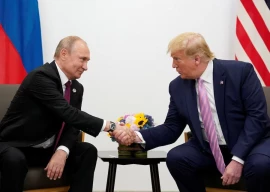
Syrian envoy Yussef Ahmad denounced the move as illegal, saying Damascus had already implemented the deal and accusing the United States of ordering the suspension.
He also charged that the League was trying to "provoke foreign intervention in Syria, as was the case in Libya."
US President Barack Obama praised the move and EU foreign policy chief Catherine Ashton expressed her full support. The opposition Syrian National Council said it was a "step in the right direction."
A statement, read by Qatari Prime Minister Hamad bin Jassemal Thani, said the League had decided "to suspend Syrian delegations' activities in Arab League meetings" and to implement "economic and political sanctions" against Damascus.
Sheikh Hamad said the suspension would last "until the total implementation (by Syria) of the Arab plan for resolving the crisis accepted by Damascus on November 2."
In Damascus, hundreds of angry demonstrators showered the Saudi embassy with rocks before some broke in, breaking windows and sacking the premises, Saudi state news agency SPA reported.
Demonstrators also broke through the gates of the Qatari embassy and took down the country's flag, replacing it with a Syrian one, an AFP photographer said.
Ahmad insisted to reporters in Cairo that Damascus had "implemented all the articles of the agreement," even though at least 125 people have reportedly been killed in the flashpoint city of Homs alone since the deal was inked.
"It was clear (the decision) was decided through a US order," he said, accusing the League of working to an "American agenda."
Under the deal, the regime had agreed to release detainees, withdraw the army from urban areas, allow free movement for observers and media and negotiate with the opposition.
Ahmad also said the moves decided by League foreign ministers in a vote of 18-3, with one abstention, "put an end to joint Arab action and show that the (League's) administration is subjected to US and Western agendas."
Obama applauded the move in a statement issued from Hawaii, where he is hosting an Asia-Pacific summit.
"After the Assad regime flagrantly failed to keep its commitments, the Arab League has demonstrated leadership in its effort to end the crisis and hold the Syrian government accountable," he said.
"These significant steps expose the increasing diplomatic isolation of a regime that has systematically violated human rights and repressed peaceful protests."
Washington ditched its earlier strategy of engagement after Syrian government forces unleashed a fierce crackdown on demonstrators, which the United Nations says has claimed more than 3,500 lives.
US Secretary of State Hillary Clinton said in a statement the Arab League's decision was a "strong and historic stance aimed at stopping the violence in Syria and protecting Syrian civilians," adding the Assad regime "has lost all credibility".
British Foreign Secretary William Hague said the League's decision showed the "frustration" of its members over Assad's "intransigence".
"As Syrian security forces escalate the violence on the streets of Syria, we and others across the international community share this frustration," Hague said.
"We support the Arab League in its efforts to bring about an end to the killing of Syrian people. The continuing violence is deplorable and must stop."
A spokesman for the EU's Ashton said: "We fully support the decisions taken by the Arab League today which show the increasing isolation of the Syrian regime."
Diplomats have said the EU is readying a freeze on European Investment Bank credits and technical assistance to Syria as it mulls further sanctions on Assad's regime after months of bloodshed.
Sheikh Hamad said the measures would take effect on Wednesday, and that Arab ministers would meet again to decide on specific sanctions.
The statement also called for the protection of civilians and said League chief Nabilal Arabi would contact international organisations, including the United Nations, if the bloodshed continued.
It called for a meeting in Cairo with Syrian opposition groups in three days to "agree a unified vision for the coming transitional period in Syria." The opposition would later meet Arab foreign ministers.
A week of deadly violence in city of Homs overshadowed the meeting, in which ministers had appeared divided on what measures to take. Human rights groups say the regime has intensified its crackdown, especially in Homs.
At least 23 people were killed in violence in Syria on Friday alone, most of them civilians in Homs, which an opposition group declared a "humanitarian disaster area" earlier this week.
On Saturday, at least 13 people died, nine of them members of the security forces, in clashes in the northwestern province of Idlib and two civilians were killed in Homs, the Syrian Observatory for Human Rights said.
COMMENTS (2)
Comments are moderated and generally will be posted if they are on-topic and not abusive.
For more information, please see our Comments FAQ
1730959638-0/trump-(19)1730959638-0-405x300.webp)






1727523993-0/Copy-of-Untitled-(7)1727523993-0-270x192.webp)









Who wants to bet that if the UN gets contacted, suddenly they'll be the bad guys? It's cold but, I hope it falls on deaf ears at that point. Let those nations get a feeling of responsibility for their own actions. Maybe when the "victimized" Muslims have to take care of their own problems for once amongst themselves they'll have a more realistic view of the situations they create and maybe end up with a shred of appreciation for NATO. Otherwise known as the countries they, themselves, would never help and while speaking positively of their deaths.
Yeah. It's not very humanitarian of me to say it. But there are plenty of other people on the planet and most not only take the assistance for granted but condemn them for it. The whole issue in that part of the world is them having messed up and unrealistic self images.
The only assistance they should receive are an overabundance of Qurans for their moral support and invincibility.
Bashar al Assad has no doubt sleepless nights. He knows he can't go on massacring his people. Yet he dreads the consequences of stepping down, having seen the inglorious ends of the other autocrats. He has no other choice than to play by ear and live from day to day. The Arab League dreads also the consequences of a vacuum left behind by Bashar. The al Assad dynasty has been dominating Syrian politics since 1970, after Hafiz, Bashar's father toppled the dictatorial regime under unstable military rule.